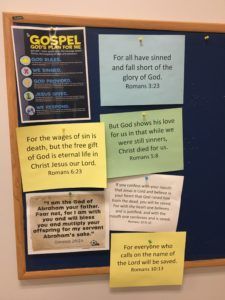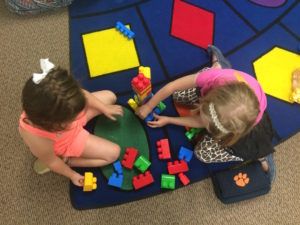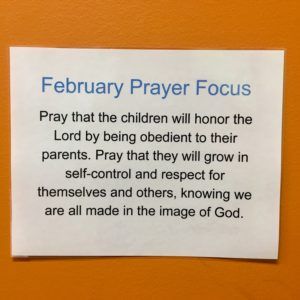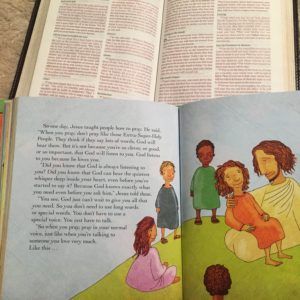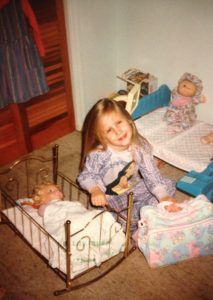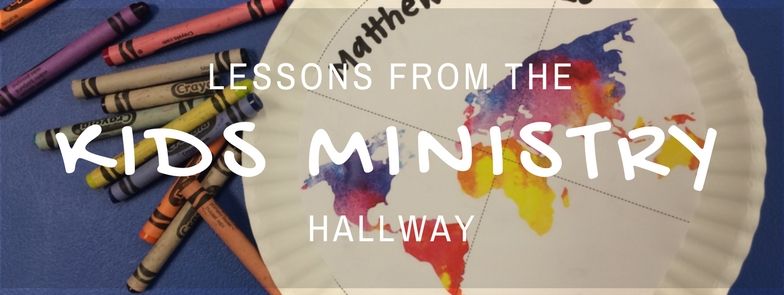
17 Apr LESSONS from the Kids Ministry Hallway
I have always wanted to work with children. From the time I started kindergarten until my high school graduation, anyone who asked me what I wanted to be when I grew up heard the same answer?a teacher! I was thrilled to teach preschool when I graduated from college, but the longer I spent time in that vocation, I realized how much brokenness and pain were evident in the lives of my students?even at the age of four! Knowing that our only hope of redemption and new life is found in Christ Jesus and desiring to share this most important news with children, I finished out my second year of teaching and interviewed to be a GenerationLINK resident. My desire was to use my gifts and teaching experience to serve the local church and learn what it looks like to impart truth from Scripture to children and families through serving in Kids Ministry full time. I am currently in the midst of my second year of the residency, and I have been challenged and spurred on in my own walk with the Lord and in my role as an ambassador for Christ as I have labored alongside our pastors, staff members, and other residents every week to make disciples of the next generation.
Here are some lessons I have been learning as the Lord has graciously given me ministry experience during my time as a GenerationLINK resident serving families and children. This is certainly not exhaustive, and I have so much more to learn as I pray and seek wisdom from the Lord in my current role. My prayer is that these lessons I have learned would be helpful to you as you minister in your church, in whatever context that might be.
Teach the Bible intentionally
One Sunday morning I sat in our 4K – 5K Kids Worship class and watched one of our volunteers teach the Bible lesson. ?I will never forget some of the key things she said and did. First, while introducing the lesson she referred to the Bible story as the ?Bible account.? She even asked the kids to remind her why she called it a Bible account instead of a Bible story, and they answered, ?Because it?s true!? She affirmed their answer and proceeded to explain again that when we hear the word ?story? we tend to think ?make believe? or ?fictional,? but what we read in the Bible is true and real. It struck me that day that we do children a disservice when we forget to emphasize that Biblical accounts are historical and factual. No matter what vocabulary we use, the way we teach should very clearly show that the Bible is true.
I have also learned what it looks like to include little things in each lesson that teach children Bible skills. We want kids to be familiar with the order of the books and to know how to find a chapter and verse as well as other basic characteristics of the Bible. Our elementary aged kids look up the Bible passage they are studying in class each week. We have a class set of Bibles, and the teachers guide them in finding the book of the Bible, the chapter, and the verses. Our kindergarten class even looks up the Bible passage, although some of them are not yet reading! One of our teachers shared with me recently that since her kids know the letter names, they have built upon that skill and taught them to look up books by not only telling them where in the Bible it is (near the beginning, in the middle, towards the end) but also by looking at the beginning letters. We are studying the Old Testament right now on Sunday nights, and they have learned that Genesis starts with a G, not a J, and Exodus starts with an E, not an X. (Very confusing for kids learning phonics!) Learning where children are in their cognitive development has been helpful to our teachers as they learn to tailor their teaching to build on skills children already know.
I have also started asking my preschool class each week if the Bible account is from the Old or New Testament. On a basic level, we say that the Old Testament includes everything that happened before Jesus came to Earth as a baby, and the New Testament includes Jesus? life, death, and resurrection, and what happened after He ascended to heaven. We want our kids to start learning the basic timeline of the Bible.
We also want to be sure we?re holding the Bible when we teach. This seems like a small thing, but we have realized it is of great importance! We use a great curriculum that is incredibly Gospel-centered and also provides printed lessons each week. It is possible for a teacher to read from the printed pages of the curriculum and teach truth without once opening the Bible, but we want to be sure we?re teaching that what we are learning comes from Scripture. As adults, we would be skeptical of a pastor who didn?t open the Bible while preaching. Kids don?t know to be looking for that yet as one factor to help discern sound teaching, but we want them to start learning that the Bible is where we find God?s written Word. We want them to start learning that the Bible is our authority, inspired by God, and it has everything we need for teaching, reproof, correcting, and training in righteousness.
Point them to Christ
You and I have no greater need than Christ, and the same is true for our children. They have no greater need than Christ! In all of our lessons, we teach a Christ Connection that explains how the Bible account is connected to God?s grand redemptive plan. As I prepare to teach each week, rehearsing these truths gives me a deeper understanding of the gospel and leads me to praise the Lord.
My goal each week is for the kids to leave my room remembering something about Jesus. In my preschool class, it is usually such a seemingly simple, but deeply important truth! In our recent Easter Sunday lesson on Jesus? Crucifixion and Resurrection, the truths for preschoolers and toddlers to learn were:
- Jesus always obeyed God.
- Jesus died on the cross, but God made Jesus alive again.
- God sent Jesus to earth because He loves us.
These are foundational truths, grounded in Scripture, and if you grew up in church, you might not even remember the moment you learned some of these truths for the first time, but they are essential in understanding the depth of the gospel. All of the knowledge stored up in these children?s hearts and minds can be used by the Lord to bring them to an understanding of their sin and need of a Savior. We also had our children participate in memorizing the Romans Road when our congregation was learning it all together. We utilized Scripture memory games and a lot of repetition, and it was a joy to hear many children reciting the verses and hearing families say they were working on it at home as well.
Be sing-song-y and Fun!
Church is not at all boring! I teach my kids that sometimes we sit still and listen, and sometimes we get to dance, sing, run, and scream. (Yes, I do let them scream sometimes!)
With singing, I have found that it is not only a good learning tool, but it is also a classroom management technique. When you start singing, kids will usually just stop what they are doing and look at you. Of course, this is not always guaranteed, but there?s a high chance it will work. Any kind of change in your voice during a transition?singing, whispering, or speaking in a silly voice?will often cause them to stop and look at you long enough for you to give instructions and guide them to the next thing. In my preschool class each week, I sing a song to help them know when it?s time to clean up the toys.
Every week we are sure to sing a song that teaches Biblical truths, but we don?t just sing. We play rhythm sticks and shake jingle bells, we whisper sing and scream sing, and we sing super fast and super slow. We will literally sing the same song 6 or 8 times in a class session doing it all those ways, and some of the kids are just giggling by the time we are done. My current favorite that we do is ?My God is So Big.? Here are the words in case you have never heard it:
My God is so BIG, so strong, and so mighty
There?s nothing my God cannot do.
My God is so BIG, so strong, and so mighty
There?s nothing my God cannot do.
The mountains are His, the rivers are His,
The stars are His handiwork too.
My God is so BIG, so strong, and so mighty
There?s nothing my God cannot do.
We have hand motions that go with it, and we start by singing it at regular speed. Then we sing it extremely S L O W and exaggerated. Then we do it fast, and lastly we do it super fast. By the end the kids and teachers are just laughing and laughing, but it brings so much joy to my heart. Do you know that we are teaching theology when we sing that song? We are learning that God is Creator, He is omnipotent, and He has all the authority in the heavens and the earth.
Some of our other favorites to sing are ?I Love You Lord,? ?Jesus Loves Me,? and ?Shout Hosanna!? With ?Shout Hosanna? we like to sing the chorus over and over, and sometimes we even go crazy and sing the bridge.
Involve them in Learning
We like to do plenty of active games and hands-on activities each week that closely relate to the Bible passage we are learning. We built a tower out of blocks when we learned about the Tower of Babel from Genesis 11, and recently when we were learning about Paul?s missionary journeys, we put up a tent in the classroom and the kids sat in the tent while the teachers taught the lesson to remember that Paul was a missionary and a tentmaker.
Our oldest kids transition out of Kids Worship and begin attending the worship service in 4th grade. Our conviction is that we want parents to lead in choosing what is best for their own children, and so some families choose to have their kids in worship with them starting in kindergarten, and we are so happy for them to do that as well. For the ones who do attend Kids Worship, they are not dismissed from the sanctuary until 30 minutes after the service has started, and we intentionally do this so that kids can worship through song, participate in the time of offering, hear our pastors and staff members pray, and observe the ordinance of baptism when it occurs. This involvement in worship allows children to see the body of Christ worshipping and living out the commands of Scripture in community, and they are hearing truth in what is spoken by our worship leader and pastors. We usually have the Lord?s Supper near the end of the service on the weeks when we do it, so unfortunately the children in Kids Worship miss the chance to sit and observe this ordinance. I always advocate for families to pick up their children every now and then and bring them back into the service if they wish, because I believe it is an incredibly valuable experience for a child to experience the gospel through observing the Lord?s Supper.
Pray intentionally and teach them to pray
Each week our nursery volunteers intentionally pray for our babies, toddlers, and preschoolers. We are praying for their salvations and we are praying that they would grow in godliness and bear fruit for the Kingdom. We have monthly prayer focuses that we post in our classrooms, and another goal we have we these focuses is to resource parents with ways they can be praying for their children each day and month.
We also strive to model prayer often, and we do this by having the teachers pray out loud during class time at the beginning and end of the lesson. Children might not hear prayer at home and they need to hear how maturing Christians pray. When we pray aloud and say things about who God is in praise to Him, the kids are hearing it and learning about the attributes of God and about His glorious works! As we pray for the needs of others, they hear how we offer supplication. As we confess sin, they learn what sin is and how to confess sin, and they also learn that grown-ups do not have it all together. Also, having the teacher pray allows the teacher to maintain control of the class. He can make it a short, quick prayer, or he can make it longer depending upon the age of the kids and their attention span. Have you ever asked a child to volunteer to pray and he or she starts praying for every person and animal they have ever met? As precious as that is, the class can become restless. There is absolutely a time for having children pray, and you may do it once in a while in a kids class at church, but I have found that class time is a valuable opportunity for the adults to model prayer and teach the children. A great paraphrase of Jesus? Sermon on the Mount with the focus on how to pray can be found in the Jesus Storybook Bible, and I always love to pray the Lord?s prayer from Matthew 6 when I have the chance to model it.
Trust the Lord
This is the hardest part of children?s ministry for me. We spend our days, weeks, and months planning, creating, teaching, nurturing, and disciplining, and it is often difficult to see the fruit of that labor. It is hard to see the children we love walk in sin and not yet surrender their lives to Christ. It is hard to know what spiritual truths and life experiences children are internalizing and how the Lord is working in their hearts. But I am reminded that when a gardener plants seeds, they are hidden under the soil until the Lord causes them to grow! We are not in control, friends, and praise the Lord that He is! We do not know what the future holds, but we are to pray, entrust our children to our Father, and keep asking for wisdom everyday. It is the Lord who saves, and it is both a privilege as well as a responsibility that we have to our children to teach, shepherd, and point them to Christ.
We do not know how the Lord will orchestrate the lives of these little ones for His glory and their good. As I reflect on my own life, I am thankful for the men and women who taught and shepherded me through my growing up years and planted so many seeds, and for those who have discipled me and walked through many seasons with me since I came to faith as a high school student. Who knows? The little girl you teach every week in the children?s ministry who won?t put the baby dolls down may grow up serve in the church nursery. I am so thankful to the Lord for the opportunities He has given me to serve and love the littlest ones in our church. May we continue to ask the Lord for wisdom and pray for our kids!
*References to the lessons and activities used are from the Gospel Project for Kids Preschool and Younger Kids Curriculum Packs from Lifeway
Lisa Burgess
Generation LINK Resident
Clemson, SC



